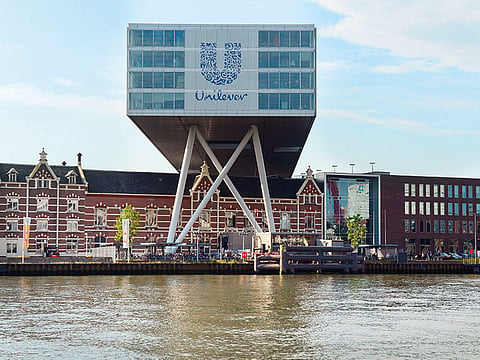Unilever finally decides to consolidate operations in London itself
It will combine UK and Dutch units into one, giving it more flexibility on future plans

London: Unilever plans to combine its UK and Dutch arms in a single British parent, reversing a previous plan to consolidate in the Netherlands.
The move would boost flexibility for stock-based acquisitions and divestments, and the COVID-19 pandemic is making that more important, the maker of Dove soap and Ben & Jerry's ice cream said.
The move represents a shift by CEO Alan Jope from the approach of his predecessor, Paul Polman. His effort to favor a Netherlands base was abandoned two years ago in the face of fierce opposition from UK shareholders.
Just because the company got a "bloody nose" in 2018, it wasn't going to "kick the can down the road on this for a few more years," Chairman Nils Andersen said. "This has been needed for at least 40 years - the structure of the company is outdated and not competitive."
Splitting up options
The latest about-face will prompt speculation that Unilever plans to split its food and household-product arms into an independent company. The consumer-goods maker said it promised the Dutch government that if it would ever do so, that business would be incorporated and listed in the Netherlands.
Eliminating dual legal structures will result in one class of shares and a single pool of liquidity, Unilever said. The consolidation will be implemented through a cross-border merger between Unilever Plc and Unilever NV - the respective Dutch and British arms.
An 18-month review process
The revised plan follows an 18-month strategic review, the company said. Unilever NV shareholders will receive one new Unilever Plc share in exchange for each share held.
Unilever plans to maintain listings in Amsterdam, London and New York. The previous plan failed in part because it would have resulted in the company's ejection from the UK's benchmark stock index, creating problems for institutional investors.
A separate review of Unilever's tea business has demonstrated that the dual-headed legal structure can create disadvantages, Unilever said. The company previously has moved to shed other slow-moving businesses, such as its spreads unit, while investing in niche areas such as vegan food.
Focus on food
Separating the food division as an independent company would enable Unilever to lessen its focus on an intensely competitive business, where its Hellmann's mayonnaise faces US price wars with Kraft Heinz Co.'s rival products and its ice cream is being challenged by low-calorie entrants such as Halo Top.
Kraft Heinz's failed 2017 bid to take over Unilever spurred Polman's efforts to boost the Anglo-Dutch company's growth and to seek protection from future predators.
The consolidation into a UK parent company "will enable Unilever to shift to higher-growth categories faster," Investec analyst Alicia Forry wrote in a note to investors.
No impact on staffing
The organizational streamlining won't affect staffing levels or business activities in either country, it said. The headquarters of Unilever's foods and refreshment division, which represents around 40 per cent of the company's sales, will continue to be based in Rotterdam. The home care and beauty & personal care divisions will continue to be headquartered in the UK.
"With the flexibility that unification provides, the Dutch government has also asked for reassurance that if Unilever should ever choose to list the foods & refreshment division as an independent company, it would be incorporated and listed in the Netherlands," Unilever said. "The Netherlands is an attractive headquarter location for business and provided it continues to be as such, Unilever is comfortable to make these commitments."
The company has maintained dual nationality since the 1930 merger of Margarine Unie of the Netherlands and U.K. soapmaker Lever Brothers.
Ditch the Dutch plan
The company's previous plan to combine its headquarters in the Netherlands was seen as a blow to the UK government's Brexit hopes, though Unilever denied any link to Britain's departure from the European Union.
That plan had been developed as the Dutch government was moving to scrap a dividend tax in a bid to make the Netherlands more attractive to employers. The proposal was dropped after Unilever abandoned the Rotterdam move. The government said it was disappointed with the new course shift on Thursday.
The Netherlands would "prefer the structure to be simplified with only a Dutch NV" as parent company, Minister of Economic Affairs and Climate Policy Eric Wiebes wrote in a letter to parliament. "At the same time, the cabinet understands that this simplification has no consequences for the activities in the Netherlands."
Sign up for the Daily Briefing
Get the latest news and updates straight to your inbox



